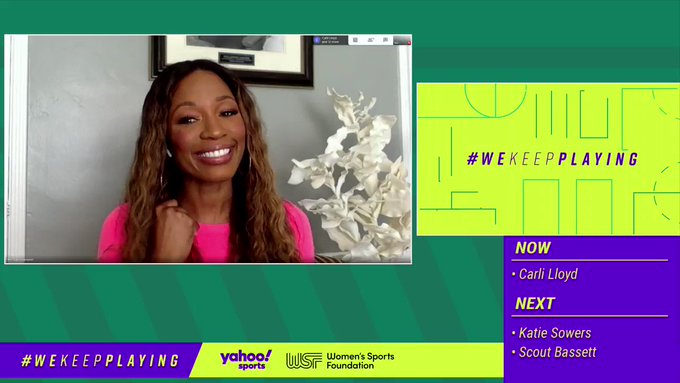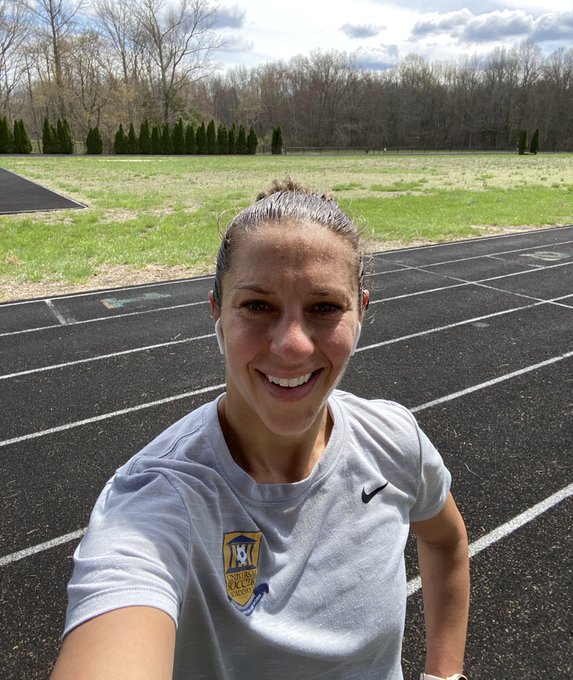Despite the postponement of the Tokyo Olympics and the suspension of the NWSL, Carli Lloyd said the U.S. women’s national team isn’t slowing down its fight to create a better future for women’s soccer.
During an online panel hosted by Yahoo! Sports and the Women’s Sports Foundation Saturday afternoon, the U.S. co-captain said the culture of the women’s national team — and women’s sports as a whole — rests on a relentless desire to constantly improve the game for the next generation.
“I think it’s just been this evolution,” Lloyd said. “You had those players back then to push the barriers and make things better. They’ve made the sport better than when they entered it and that’s really what it’s all about. It’s just been a culture that has really never been able to be broken.”
The panel included six other leading women’s athletes — U.S. Paralympic runner Scout Bassett; record-breaking NCAA women’s basketball player Sabrina Ionescu; six-time Olympic medalist swimmer Katie Ledecky; WNBA star Chiney Ogwumike; two-time Olympic medalist hockey player Kendall Coyne Schofield; and San Francisco 49ers assistant coach Katie Sowers, the first woman to coach in a Super Bowl.
The panel was part of the We Keep Playing campaign started by the Women’s Sports Foundation, which was founded by tennis star and women’s rights activist Billie Jean King in 1974. King was featured on the panel along with a guest appearance from Condoleezza Rice, the former secretary of state who now champions women’s sports.
"I've always been a kid who loves a challenge. I've never backed down from any challenge."
Carli Lloyd discusses whether we'll see her in the NFL one day. #WeKeepPlaying
See Yahoo Sports's other Tweets
King outlined her three main goals for the foundation — providing a space for all girls to compete in sports; molding a society where girls are appreciated for their accomplishments, not their looks; and establishing leagues in which women can make a living entirely from sport.
For many of the athletes on the panel, the third goal — making a living while playing sports — has become a primary focus in recent years.
The WNBA Players Association recently inked a groundbreaking collective bargaining agreement, increasing salaries and including stipulations for maternity leave.
The U.S. women’s national team, meanwhile, is awaiting a June trial date for its equal pay lawsuit against U.S. Soccer. The players allege the federation paid the women’s team less than the men’s side despite its far superior results. The federation has countered the two teams have different collective bargaining agreements that dictated differences in compensation. U.S. Soccer had to drop a controversial, sexist argument the teams did different jobs and the women were inferior athletes compared to the men.
While other leagues make major strides toward living wages for all players, women’s hockey remains in the early stages of the compensation battle. Coyne-Schofield wore her Professional Women’s Hockey Players Association shirt to the panel, representing a union that was formed last May.
Coyne-Schofield said players have to relentlessnessly work to establish a unified, sustainable hockey league in North America.
“Right now the professional landscape of women’s hockey is a disaster,” Coyne-Schofield said. “So until we can change that and look at young girls and show them what the dream is about — and that dream is growing up and being a professional athlete and making a living doing it — our goal has not been met.”
Coyne-Schofield reflected on the community formed between many women athletes, pointing out that King has worked through the Women’s Sports Foundation to help female hockey athletes establish their players association.
That cross-sport collaboration was seen across the panel. Many athletes were familiar with each other after working with the Women’s Sports Foundation, competing in the U.S. Olympic team or playing the same sport.
Ogwumike, for instance, offered advice to Ionescu as she prepares for the WNBA draft next week. The Oregon star is expected to be selected with the No. 1 overall pick.
“We as a society sort of realized as women, we don’t need to be competitive anymore,” Ogwumike said. “Right now we are all collaborative and achieving what we want. That’s the direction we’re heading and that’s why it’s so cool because a lot of people in this conversation today, I’m already cool with them because we are harnessing everyone’s collective power”
The four Olympians on the panel discussed what the delayed Tokyo Olympics meant for them.
Despite their disappointment, the Olympians said they were relieved the Games were postponed. Ledecky said it was the only possible decision, and Lloyd added the USWNT will use the extra time to prepare more for the tournament.
Now, with their leagues and training sessions suspended, the athletes said they’re finding new ways to utilize their sudden wealth of time at home.
Coyne-Schofield, meanwhile, has enlisted her husband — an NFL offensive lineman who most recently played for the Denver Broncos — to help her with stick handling drills and bike rides every day.
Lloyd said the past few weeks of quarantine have been the best period of training she’s had in her life. Without external distractions, she said she’s been able to focus entirely on her fitness, using a gym in her basement to work out and going outside to get touches on the ball.
The equal pay lawsuit has been a challenge off the field for the U.S. national team during the past year, but Lloyd said it has also served as a form of inspiration for many women and fans.
She said she was similarly inspired by her predecessors on the national team. Lloyd said she was in the stands for one of the games of the 1999 World Cup, and from the crowd she envisioned herself one day wearing the American kit on the field.
To Lloyd, the brand of the USWNT has always rested on the ideal of fighting for something bigger.
“Obviously we’ve been very successful over the years on the fields, but I think more importantly what we’re doing off the field has been so powerful,” Lloyd said. “I think we’ve been so powerful as one. We’ve been inspirational by winning and doing all that but most importantly for what we stand for and just how hard and brave we’ve been off the field.”
The athletes discussed a shared dream of leaving women’s sport in a better state for the next generation.
Coyne-Schofield said she often corrects young hockey players who tell her they hope to play like her when they’re older.
“No you don’t,” she tells them. “I want you to be better than me.”
To King, this is the role of the We Keep Playing campaign and the Women’s Sport Foundation — creating an active source of inspiration for young athletes to continue pursuing their athletic dreams.
“If I were a kid again and seeing all of these athletes, oh I would just jump out of my skin,” King said. “This is just heaven for me.”



 and a perfect day to complete 10 x 800s!
and a perfect day to complete 10 x 800s! 



Nenhum comentário:
Postar um comentário